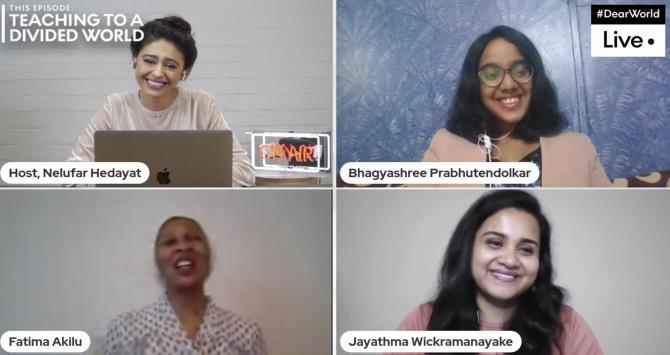
Over 250,000 watch debut of Doha Debates #DearWorldLive programme season 3
(MENAFN- The Peninsula) Better teaching in schools is needed to empower young people to help bridge polarised differences on the most challenging issues of our time, education advocates have told Qatar Foundation's Doha Debates' #DearWorldLive programme. The programme featured solutions from three education activists: Jayathma Wickramanayake, United Nations Secretary-General's Envoy on Youth; Dr. Fatima Akilu, a Nigerian psychologist and expert on countering violent extremism; and former Australian Prime Minister Julia Gillard, chair of the board of the Global Partnership for Education. Wickramanayake said that young people are uniquely positioned to tackle polarisation.
They are not only incredibly resilient but 'have the fantastic ability to reach across the divide and build coalitions to drive towards a common goal, often by holding the leaders of previous generations accountable. Wickramanayake argued that 'affordable, accessible, and quality education is one of the most important tools that we have at our disposal in fighting social inequalities, which in turn will help us deal with polarization. Dr. Akilu, the director of Nigeria's Neem Foundation, said: 'We see polarization because schools are not as inclusive of differences. 'We must not only look at education in terms of numbers, but in terms of content. When we talk about education, we just talk about people being in school, but we have to talk about how [you are] taught to navigate your way around differences. To tackle these challenges, she said: 'Education has to always adapt. Curriculums must continually evolve, and that it is necessary to really address the issues of access and funding more spaces for girls and more equality within the education system.
The season three debut episode of #DearWorldLive coincided with the educationfocused SXSW EDU Conference and Festival, where Doha Debates is a featured exhibitor. More than 250,000 viewers around the world w a t c h e d t h e l i v e programme. Gillard, the board chair of the Global Partnership for Education, said: 'Building back better would mean putting gender equality right at the centre of decision-making and making sure every child could get a great quality education.
Otherwise, she warned: 'I see another future, and it's the one that we need to avoid, and it's the one where government budgets are really hit by the economic shock of COVID-19, [where] governments retreat their expenditure on education. That cements preexisting inequalities based on poverty and race and gender. That, to me, is the future we definitely have to reject. The programme included comments and questions from around the world, including Bhagyashree Prabhutendolkar, an Indian student and the founder of Youth Magazine. Prabhutendolkar said: 'Progress can only happen when you realize that learning should be endless. As a student, you never just stick to textbooks — especially in this polarized world.

Legal Disclaimer:
MENAFN provides the
information “as is” without warranty of any kind. We do not accept
any responsibility or liability for the accuracy, content, images,
videos, licenses, completeness, legality, or reliability of the information
contained in this article. If you have any complaints or copyright
issues related to this article, kindly contact the provider above.


















Comments
No comment